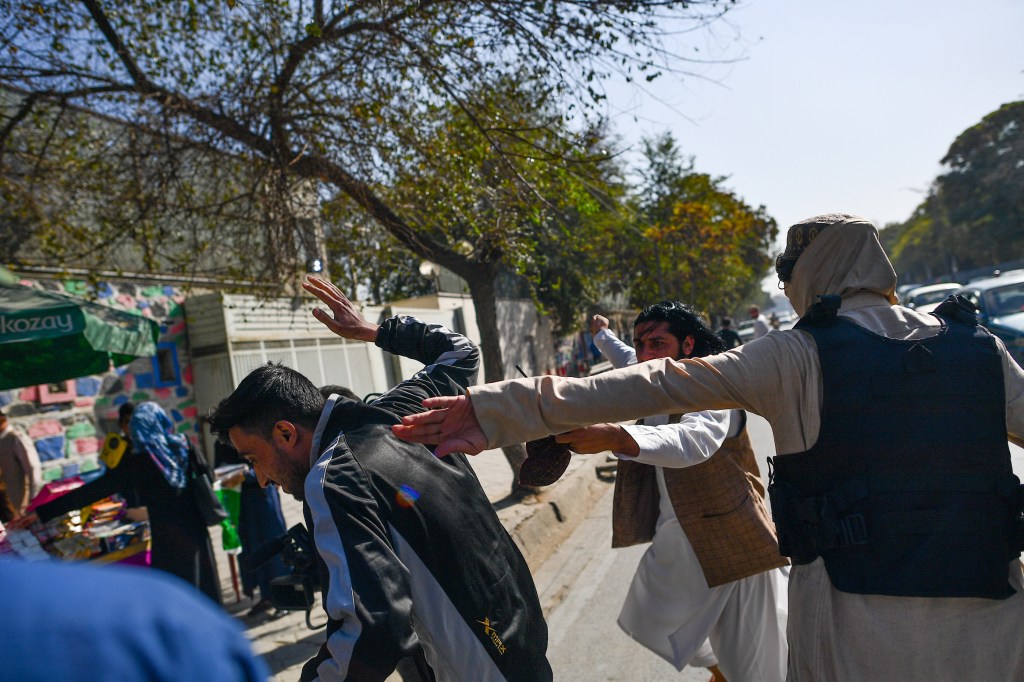One year after the Taliban’s return to power, Afghan media is in crisis. Between censorship, arrests, assaults, restrictions on women journalists, the flight of many Afghan journalists, and the country’s declining economy, Afghan media outlets are struggling to survive.
CPJ special report “Afghanistan’s media crisis” finds a deterioration in press freedom over the last year. At the same time, the report showcases the tenacity and vital reporting by those journalists who remain and the valuable work of Afghan journalists working in exile.
In a joint letter Thursday with 11 other journalist safety and press freedom groups, CPJ urged U.S. Secretary of State Antony Blinken to expedite visas for Afghan journalists.
Read the report on our website, watch a video that features some of its authors, and engage with us on Twitter.
On August 16, join us for a virtual panel discussion moderated by CPJ President Jodie Ginsberg on the state of press freedom in the country one year after the Taliban takeover. RSVP here.
Report’s sections:
- Afghanistan’s media faces crisis—and opportunity
- Inside an Afghan news network’s struggle to survive
- ‘I thought about the efforts and struggles of two decades… and cried’
- Kathy Gannon: Courageous journalism is happening in Afghanistan. We can help.
Read CPJ’s recommendations for protecting journalists and press freedom in Afghanistan here. They are also available in:
- DRC journalists Daniel Aloterembi and Fify Kibwana attacked outside Kinshasa court
- South Sudan journalist Diing Magot arrested while covering protest for Voice of America
- Iraqi Kurdish authorities detain, raid, harass journalists and media outlets covering protests
- Crew with Indian broadcaster WION News beaten, detained by Taliban in Kabul
- DRC journalist Pacifique Mahamba in hiding amid police search
- Kyrgyz authorities block news website Res Publica under controversial false news law
- DRC journalist Jean Christian Bafwa Kabaseke receives death threat over coverage of militant group
- Journalist Isabella Yevloyeva faces 3rd criminal case for ‘fake’ reporting about Russian army
- Photographer Aye Kyaw reportedly dies in Myanmar military custody
- Authorities fine, ban Moldovan journalist Val Butnaru from media work
- Israeli authorities order 4-month detention of Palestinian journalist Amer Abu Arafa, block TRT reporter Majdoleen Hassouna from leaving West Bank
- Japanese journalist Toru Kubota faces prison over Myanmar protest coverage
- Nigerian authorities fine 4 broadcasters over reporting on security issues
- Zimbabwe police charge 2 journalists with publishing false information
- Lebanese photojournalist Hasan Shaaban beaten, threatened with death
On August 13, 2012, U.S. freelance photojournalist Austin Tice emailed his father to say he was wrapping up his reporting in Syria. He was detained the next day and his parents have not heard from him since.
Ahead of the 10-year anniversary of Tice’s disappearance, The Washington Post mounted a banner on the exterior of the newspaper’s headquarters in Washington, D.C., on Tuesday. It will also launch the #BringAustinHome campaign across its website on Sunday, August 14.
On Wednesday, U.S. President Joe Biden released a statement saying, “We stand with Austin’s many loved ones, and we will not rest until we bring Austin home.” Watch CPJ’s video on Tice’s disappearance.
CPJ joined 19 other civil society organizations on Monday in an open letter to U.S. Secretary of State Blinken and National Security Adviser Jake Sullivan, urging the Biden administration not to provide its full proposed military aid to Egypt due to the country’s treatment of journalists and other human rights abuses. Read the letter here.
What we are reading (and listening to)
- For ransomware gangs, journalists are another tool of the trade — Tim Starks, The Washington Post
- Guatemala’s Corrupt Officials Train Their Sights on the Press — Francisco Goldman, The New York Times
- Inside a TV news station determined to report facts in the Taliban’s Afghanistan — Steve Inskeep and Arezou Rezvani, NPR
- Cambodian Journalists Are Telling Truths, Not Breaking Laws — William Echols, Polygraph.info
- Hamas issues, then rescinds, sweeping rules on Gaza coverage — Tia Goldenberg and Joseph Krauss, The Associated Press
- Austin Tice Has Been Held Hostage Longer Than Any American Journalist Ever. His Texas Family Is Still Fighting for His Return. — Sonia Smith, Texas Monthly
- ‘Not even Orwell could have dreamed up a country like this’: Journalists forced to flee Nicaragua en masse — Kate Linthicum, Los Angeles Times
- How Independent Journalism Is Filling Gaps in the European Media Landscape — Malte Warner, Global Investigative Journalism Network
- Afghanistan: Taliban’s Catastrophic Year of Rule — Human Rights Watch
